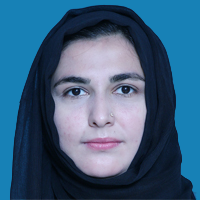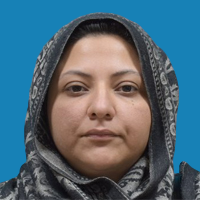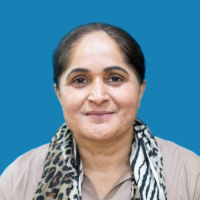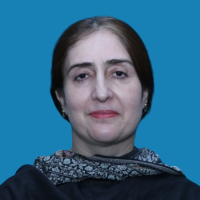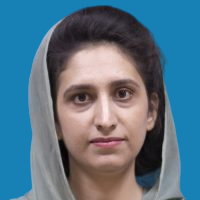| 1 | S. Wasti, J. Ahmed, and M. Khan, “Role of successive round as a quality signal in equity crowdfunding: Novel evidence from the perspective of investors’ preferences,” PLOS ONE, vol. 19, no. 3, p. e0297820, 2024. | 2024 |
| 2 | J. Ahmed, U. Farooq, A. A. Al-Naimi, M. I. Tabash, and K. Drachal, “Empirical linkages between branching, lending, and competition: A study of pakistani banks,” Economies, vol. 11, no. 5, p. 145, 2023. | 2023 |
| 3 | S. M. H. A. Wasti and J. Ahmed, “Comparative role of quality signals and social network activities in overfunding: Evidence from equity crowdfunding,” The International Journal of Entrepreneurship and Innovation, p. 14657503231170076, 2023. | 2023 |
| 4 | B. H. Subhani, W. Wei, J. Ahmed, and U. Farooq, “Impact of firm reputation on firm financing decision: Evidence from non-financial sector of pakistan,” Journal of Finance and Accounting Research, vol. 4, no. 2, pp. 53–74, 2022. | 2022 |
| 5 | J. Ahmed, Raies, U. Farooq, and B. H. Subhani, “The moderating role of information and communication technology in the nexus between financial development, economic growth and energy consumption,” OPEC Energy Review, vol. 46, no. 4, pp. 399–412, 2022 | 2022 |
| 6 | J. Ahmed, S. ur Rehman, Z. Zuhaira, and S. Nisar, “The nexus between financial development and energy consumption: Estimating the role of foreign direct investment, economic growth and urbanization,” Energy & Environment, vol. 33, no. 8, pp. 1562–1582, 2022 | 2022 |
| 7 | M. Yaseen and J. Ahmed, “Climate change awareness and concerns among intermediate students in district kech,” SHAJAR, vol. 4, no. 3 & 4, pp. 11–26, 2022 | 2022 |
| 8 | U. Farooq, J. Ahmed, W. Akhter, and M. I. Tabash, “Environmental regulations and trade credit activities of corporate sector: A new panel data evidence,” Journal of Cleaner Production, vol. 363, p. 132307, 2022 | 2022 |
| 9 | U. Farooq, J. Ahmed, and M. Shahbaz, “How various energy sources affect industrial investment? empirical evidence from asian economies,” Energy, vol. 248, p. 123536, 2022.
| 2022 |
| 10 | M. Sheraz, D. Xu, A. Ullah, J. Ahmed, and Q. Jiang, “Nexus between energy consumption, financial market development, and urbanization: Evidence from emerging economy,” The Singapore Economic Review, pp. 1–20, 2022. | 2022 |
| 11 | M. Zulkiffal, J. Ahmed, M. Riaz, Y. Ramzan, A. Ahsan, A. Kanwal, I. Ghafoor, M. Nadeem, and M. Abdullah, “Response of heat-stress tolerant and susceptible wheat lines in diverse planting environments by using parametric stability models.” SABRAO Journal of Breeding & Genetics, vol. 54, no. 1, 2022.
| 2022
|
| 12 | J. Ahmed, M. Javaid, N. Ahmad, A. Javed, M. M. Saleem, M. Owais, M. Nadeem, S. Rahman, S. Mehboob, S. Naz, A. Rehman et al., “Monitoring and detection of wheat blast disease caused by magnaporthe oryzae triticum pathotype in punjab, pakistan.” SABRAO Journal of Breeding and Genetics, vol. 54, no. 5, pp. 1004-1015, 2022 | 2022 |
| 13 | M. Aksar and J. Ahmed, “Does managerial behaviour matter? evidence from emerging economies,” Global Business Review, p. 09721509221109054, 2022. | 2022 |
| 14 | I. A. Janjua , J. Ahmed, Compliance with IFRSs’ Disclosure Requirements in a Developing Economy. Indian Journal of Economics and Business, Vol. 20, no. 4, pp. 627-647, 2021. | 2021 |
| 15 | J. Wen, U. Farooq, M. I. Tabash, G. A. El Refae, J. Ahmed, and B. H. Subhani,“Government green environmental concerns and corporate real investment decisions: Does financial sector development matter?” Energy Policy, vol. 158, p.112585, 2021 | 2021 |
| 16 | M. Sheraz, X. Deyi, J. Ahmed, S. Ullah, and A. Ullah, “Moderating the effect of globalization on financial development, energy consumption, human capital, and carbon emissions: evidence from G20 countries,” Environmental Science and Pollution Research, vol. 28, pp. 35 126–35 144, 2021. | 2021
|
| 17 | U. Farooq, J. Ahmed, and S. Khan, “Do the macroeconomic factors influence the firm’s investment decisions? a generalized method of moments (GMM) approach,” International Journal of Finance & Economics, vol. 26, no. 1, pp. 790–801, 2021. | 2021 |
| 18 | J. Ahmed and U. Farooq, “Financial development and trade credit: Moderating role of corruption,” City University Research Journal, vol. 10, no. 3, pp. 343-362,
2020.
| 2020 |
| 19 | U. Farooq, J. Ahmed, K. Ashfaq, G. u. Hassan Khan, and S. Khan, “National culture and firm financial performance: A mediating role of firm financing decision,” Cogent Business & Management, vol. 7, no. 1, p. 1858640, 2020. | 2020 |
| 20 | R. Anwar and J. Ahmed, “Evaluating the moderating impact of family on the relationship between board independence and corporate social responsibility using propensity score matching,” South African Journal of Business Management, vol. 51, no. 1, pp. 1–10, 2020 | 2020
|
| 21 | R. Anwar and J. A. Malik, “When does corporate social responsibility disclosure affect investment efficiency? a new answer to an old question,” Sage Open, vol. 10, no. 2, p. 2158244020931121, 2020.
| 2020 |
| 22 | M. Kashif, J. Ahmed, M. Islam, and U. Gillani, “Impact of credit rating on firm performance mediating role of trade credit. evidence from pakistani non-financial firms,” Sukkur IBA Journal of Management and Business, vol. 6, no. 1, pp. 1–11,2020 | 2020 |
| 23 | J. Ahmed, Does Islamic Label Indicate Higher use of Trade Credit? Evidence from Shar¯ıah Compliant Non-financial Firms in Pakistan. Journal of Islamic Business and Management (JIBM), vol. 9, no.2, pp. 328-340, 2018 | 2018 |
| 24 | U. Farooq, J. A. Malik, and L. Muhammad, “The impact of banking sector development on capital structure of non-financial sector firms in pakistan,” Journal of Accounting and Finance in Emerging Economies, vol. 4, no. 2, pp.177–188, 2018. | 2018 |
| 25 | J. Ahmed, H. Xiaofeng, and J. Khalid, “Can trade credit serve as a cushion against the financial setbacks in a developing economy?” Journal of Convergence Information Technology, vol. 9, no. 6, p. 143, 2014. | 2014 |
| 26 | M. U. Virk, J. Ahmed, and S. Nisar, “Market timing theory and firms’financing decisions in pakistan: Evidence from non-financial firms,” Journal of Economics Finance and Accounting, vol. 1, no. 4, pp. 316-334, 2014. | 2014 |
| 27 | J. Ahmed, H. Xiaofeng, and J. Khalid, “Determinants of trade credit: The case of a developing economy,” European Researcher, vol. 83, no. 9-2, pp. 1694–1706,
2014. | 2014 |
| 28 | N. Jamil and J. Ahmed, “Natural resources—are they a blessing or curse? a systematic literature review of resource-finance nexus,” Sustainable Development, 2025 | 2025 |
































